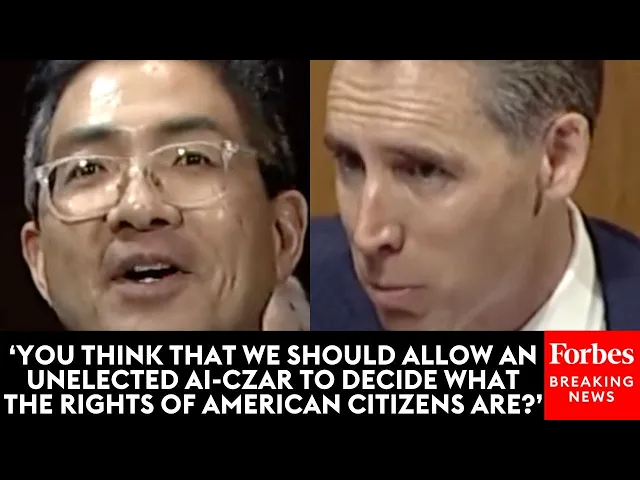MUST WATCH: Josh Hawley Mercilessly Grills Professor Over AI Copyright ‘Mass Theft’

AI copyright challenges at senate showdown
In a recent Senate Judiciary hearing, Senator Josh Hawley confronted Professor Jane Ginsburg about the contentious issue of artificial intelligence training on copyrighted materials—a confrontation that reveals the escalating tension between AI innovation and intellectual property rights. The heated exchange highlighted how AI companies are building billion-dollar businesses by training their systems on vast amounts of creative content without clear permission or compensation to the original creators. This debate sits at the intersection of technological advancement and creative protection, raising fundamental questions about fair use, ownership, and the future of creative industries.
Key points from the hearing:
-
Mass-scale copyright concerns: Senator Hawley characterized AI training as potentially "the largest theft of intellectual property" in history, alleging that AI companies are systematically harvesting copyrighted works without proper authorization.
-
Legal uncertainty: Professor Ginsburg acknowledged the unresolved legal question of whether AI training on copyrighted materials constitutes fair use, admitting that courts haven't definitively ruled on this specific application.
-
Economic imbalance: The hearing exposed the stark power disparity between individual creators and tech giants, with Hawley emphasizing how companies worth hundreds of billions are building AI systems using creators' work without compensation.
The fair use paradox
The most revealing moment came when Professor Ginsburg conceded that while individual readers can digest copyrighted works under fair use, AI systems performing mass-scale ingestion for commercial products might not receive the same protection. This distinction creates a troubling paradox in copyright law. The traditional boundaries of fair use—designed for human consumption and limited creative transformation—are being stretched to their breaking point by AI systems that can process millions of works in hours.
Why this matters: This legal uncertainty threatens both innovation and creative ecosystems. If courts determine that AI training falls outside fair use, tech companies could face massive liability and licensing requirements that would fundamentally alter their business models. Conversely, if blanket fair use protections are granted, we risk undermining the economic foundation of creative industries that depend on copyright protection to survive.
Beyond the hearing: practical implications
The hearing barely touched on real-world examples already unfolding. The New York Times lawsuit against OpenAI represents just the beginning of what could become an avalanche of litigation. Publishers, photographers, and visual artists have begun
Recent Videos
How To Earn MONEY With Images (No Bullsh*t)
Smart earnings from your image collection In today's digital economy, passive income streams have become increasingly accessible to creators with various skill sets. A recent YouTube video cuts through the hype to explore legitimate ways photographers, designers, and even casual smartphone users can monetize their image collections. The strategies outlined don't rely on unrealistic promises or complicated schemes—instead, they focus on established marketplaces with proven revenue potential for image creators. Key Points Stock photography platforms like Shutterstock, Adobe Stock, and Getty Images remain viable income sources when you understand their specific requirements and optimize your submissions accordingly. Specialized marketplaces focusing...
Oct 3, 2025New SHAPE SHIFTING AI Robot Is Freaking People Out
Liquid robots will change everything In the quiet labs of Carnegie Mellon University, scientists have created something that feels plucked from science fiction—a magnetic slime robot that can transform between liquid and solid states, slipping through tight spaces before reassembling on the other side. This technology, showcased in a recent YouTube video, represents a significant leap beyond traditional robotics into a realm where machines mimic not just animal movements, but their fundamental physical properties. While the internet might be buzzing with dystopian concerns about "shape-shifting terminators," the reality offers far more promising applications that could revolutionize medicine, rescue operations, and...
Oct 3, 2025How To Do Homeless AI Tiktok Trend (Tiktok Homeless AI Tutorial)
AI homeless trend raises ethical concerns In an era where social media trends evolve faster than we can comprehend them, TikTok's "homeless AI" trend has sparked both creative engagement and serious ethical questions. The trend, which involves using AI to transform ordinary photos into images depicting homelessness, has rapidly gained traction across the platform, with creators eagerly jumping on board to showcase their digital transformations. While the technical process is relatively straightforward, the implications of digitally "becoming homeless" for entertainment deserve careful consideration. The video tutorial provides a step-by-step guide on creating these AI-generated images, explaining how users can transform...
